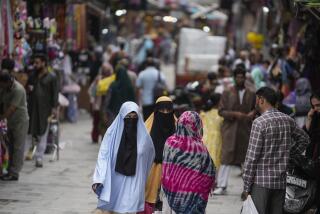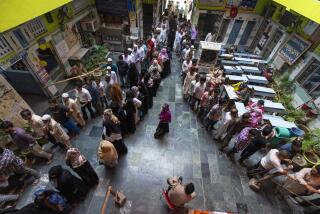Pakistan Balloting in a Peculiar Election
- Share via
LAHORE, Pakistan — In the first general election in eight years, Pakistanis vote today to pick 217 members of the National Assembly, after a controversial campaign that was peculiar by the standards of elections almost anywhere else in the world.
Soon after the parliamentary election was announced, several hundred leading Pakistani politicians were jailed. Political parties were barred from taking part. Candidates were forbidden to hold outdoor rallies or parades. No loudspeakers or public-address systems were permitted.
And the candidates have no idea what they will be empowered to do once they are elected and sworn in at the capital of Islamabad.
Whatever They Can Get
Yet after more than seven years of martial-law rule, with no authentic elections at all, the politically starved Pakistani public appears willing to take what it can get.
Even bitter opponents of the military regime of President Zia ul-Haq predict a substantial turnout to choose the members of a legislative body that has been out of action since Zia, an army general, seized power in July, 1977.
A record 1,154 candidates are running, including as many as 10 in a single district here in Lahore, the capital of Punjab state.
Zia appeared on television Sunday night to encourage voting, which he called “a religious duty.”
Equating Zia With Islam
In December, Zia staged a national referendum, seeking--and, according to official results, receiving--approval to remain in office for five more years. The wording of the referendum made it seem as if a vote for Zia were a vote for Islam, the country’s official religion.
Afterward, the government proclaimed that 60% of the eligible voters in this country of 100 million people had turned out for the referendum--a figure that journalists and opposition leaders said was actually much closer to 5%.
Yet even opposition leaders are expecting a turnout over 25% today because the races are enlivened by local issues and personalities, including the candidacies of national cricket stars. A government spokesman said he expects a turnout of at least 40%.
Gesture for U.S. Audience
Critics of the election assert that it is being held mostly as a public relations gesture by Zia--one aimed at the United States, which provides Pakistan with more than $600 million in aid annually. U.S. support for Zia, which has been criticized in Congress, includes a five-year, $3.2-billion arms agreement.
“The election is only a display to impress his (Zia’s) foreign friends,” Mazhar Ali Khan, editor of a Lahore-based political magazine, said. “(Zia’s) attempt to legitimize the regime is not acceptable to the people of Pakistan. It might be acceptable to the U.S. Congress.”
Another viewpoint was expressed by Nawaz Sharif, 36, a wealthy Lahore industrialist who is a candidate for the assembly and a leading Zia supporter. “This is a step toward the revival of the political process in our country,” Sharif said.
More to Read
Sign up for Essential California
The most important California stories and recommendations in your inbox every morning.
You may occasionally receive promotional content from the Los Angeles Times.










